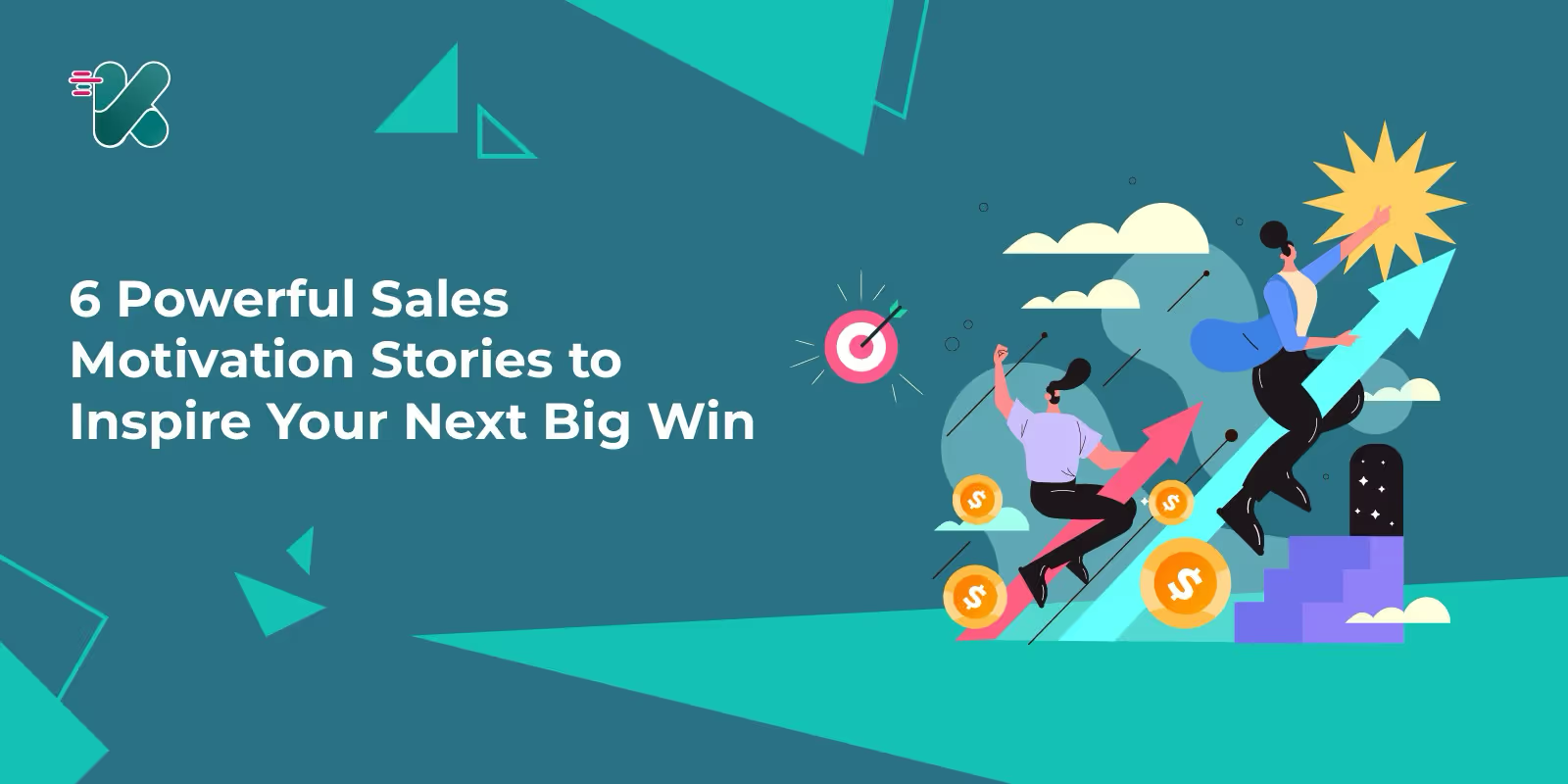
Blog
6 Uplifting Sales Success Stories to Boost Your Sales Motivation
November 5, 2024


Key Insights
6 Powerful Sales Motivation Stories to Inspire Your Next Big Deal
Sales can be a tough game. You’re riding high when deals roll in, but there are days when nothing seems to go right. In a role where rejection is common and targets are always looming, it’s no wonder sales teams need constant motivation to keep their energy high and spirits even higher.
A motivated sales team is like a well-oiled machine, unstoppable, resilient, and ready to go the extra mile.
Unmotivated employees cause up to a $550 billion loss each year (in the US alone!)
So, how do you keep that momentum alive? Sometimes, all it takes is the right story. Here are six inspiring sales motivation stories that will remind you why you’re in this game, help you see challenges in a new light, and keep you pushing forward even on the toughest days.
Why Sales Teams Need Constant Motivation

Sales isn’t a typical 9-to-5 job. There are highs, like hitting a massive target, and lows, like losing a big deal at the last minute. The emotional rollercoaster of sales requires steady motivation to keep moving forward.
- Reduces Burnout
Salespeople are often under intense pressure. Motivation helps reduce burnout by reminding them why their work matters.
- Boosts Productivity
When the team feels inspired, they’re more productive and willing to go above and beyond to close deals.
- Increases Retention
Motivated salespeople are more likely to stick around, saving you from the constant turnover that can be costly.
- Encourages Resilience
Every ‘no’ can feel like a setback, but your team can bounce back faster and keep going with the right motivation.
💡Friendly Tip: Want to keep your sales team motivated and driven? Incentivize them as much as possible! Rewards fuel their hunger for hitting those targets. Of course, managing incentives can be a real headache, but that's where Kennect comes in. This all-in-one incentive compensation management tool handles everything for you, calculations, payouts, reports, you name it, Kenect’s got it covered!
6 Inspiring Sales Motivation Stories
These stories highlight resilience, perseverance, and the power of believing in your product or vision. Whether you’re pitching a revolutionary idea, reaching out to clients, or trying to close a massive deal, these examples show that success often requires determination, creativity, and a genuine belief in what you’re offering.
1. Joe Girard – The Man Who Made Selling Cars an Art Form
Joe Girard is a legend in the sales world, widely known as the “World’s Greatest Salesman.” His journey into car sales began in a less-than-ideal way. Joe faced a rough childhood and a string of odd jobs, barely making ends meet. When he started at a Chevrolet dealership, he faced fierce competition and no formal training. But Joe had an idea: he would make each customer feel special by personalizing every interaction.
Joe developed a personal touch that went beyond the sale. He sent greeting cards to his clients on holidays, birthdays, and even random times, just to stay in touch. Every client got a handwritten message that felt genuine. He also made a rule for himself: follow up on every sale personally, ask for referrals, and build lasting relationships.
Joe’s strategy worked phenomenally well. He sold over 13,000 cars in his career, averaging around six cars a day. His ability to nurture customer relationships earned him a spot in the Guinness Book of World Records as the greatest car salesman ever.
Takeaway: Building genuine, lasting relationships can transform your career. By making clients feel appreciated beyond the transaction, you can create loyalty that lasts for years.
2. Sara Blakely’s Cold Call Journey – From Office Supplies to Shapewear Icon
Before she became the billionaire founder of Spanx, Sara Blakely sold office supplies door-to-door. She developed a thick skin from handling rejection and learned that persistence was key. When she invented Spanx, she had no connections, no marketing budget, and no retail experience, but she did have relentless determination. Sara began cold-calling buyers from department stores to get her product on shelves.
After facing numerous rejections, Sara finally convinced a buyer at Neiman Marcus to meet with her. She knew this was her big chance, so she decided to be memorable. During her pitch, Sara pulled her prototype out of her handbag, went into the bathroom, and put it on to demonstrate how Spanx smoothed her figure. The buyer was impressed and decided to give Spanx a chance.
Neiman Marcus stocked Spanx in its stores, and other retailers soon followed. With her creative approach and fearless pitching style, Sara turned Spanx into a billion-dollar company that redefined shapewear.
Takeaway: Rejection is part of the process, but persistence pays off. By showing confidence and creatively demonstrating her product’s value, Sara created a whole new market.

3. Steve Jobs and Apple’s First Big Investor – A Bold Pitch That Paid Off
In 1977, Steve Jobs and Steve Wozniak were on the verge of launching Apple Computer, but they lacked funding. Jobs reached out to Nolan Bushnell, the founder of Atari and his former employer, hoping Bushnell would invest. Although Bushnell couldn’t back the venture, he suggested Jobs reach out to Mike Markkula, a tech-savvy investor with industry connections.
Jobs took Bushnell’s advice and arranged a meeting with Markkula. Rather than giving a standard pitch, he shared a grand vision of Apple becoming a household name. Jobs didn’t focus solely on tech specs but painted a picture of the future, emphasizing his mission to bring computing power to the masses.
Markkula was sold. He invested $250,000 in Apple, giving the startup the boost it needed to release the Apple II, one of the first successful personal computers. Markkula became Apple’s mentor and a major player in its early success.
Takeaway: When pitching a bold idea, sometimes you need to sell the vision as much as the product. Jobs’ ability to articulate a larger purpose inspired a lifelong investor who would help build Apple.
4. J.K. Rowling’s Perseverance with Harry Potter – A Story of Belief Beyond Rejection
When J.K. Rowling completed Harry Potter and the Philosopher’s Stone, she faced a grueling process of trying to find a publisher. She was rejected 12 times, with publishers saying her story was too long for children and that fantasy novels had limited appeal. Despite the discouraging feedback, Rowling was convinced her story had potential.
Rowling didn’t just accept rejection. She kept submitting her manuscript to publishers. Her agent finally submitted it to Bloomsbury, where the editor’s daughter, after reading the first chapter, begged her father to publish it. This small but powerful endorsement helped convince Bloomsbury to take a chance on the book.
Harry Potter went on to become one of the best-selling book series in history, sparking a billion-dollar franchise, including movies, merchandise, and theme parks. Rowling’s perseverance turned a story she believed in into a global phenomenon.
Takeaway: Sometimes, belief in your work is what keeps you going when others can’t see the potential. Rowling’s story shows that success often requires resilience, even in the face of repeated rejection.
5. Howard Schultz and Starbucks – Turning 242 Rejections into a Global Brand
Howard Schultz saw an opportunity to bring Italian café culture to America after visiting Milan’s coffee shops. He envisioned a place where people could gather over quality coffee, but when he pitched his idea to investors, he was met with skepticism. Over 242 investors rejected him, doubting Americans would pay for premium coffee.
Schultz refused to give up. He honed his pitch, focusing on the café culture, the experience, and the community Starbucks could offer, not just the coffee. His passion for the concept was evident in every pitch, and eventually, he found a few investors willing to give his vision a chance.
Starbucks opened its first café-style store in Seattle, and today, it’s a global empire with over 30,000 locations. Schultz’s relentless passion and ability to convey his vision turned Starbucks into a household name.
Takeaway: Rejection isn’t the end; sometimes it’s just part of the journey. Schultz’s persistence, fueled by a clear vision, helped him turn his dream into reality.
6. IBM’s $1 Billion Mainframe Deal with the Social Security Administration – A Perfectly Tailored Approach
In the 1980s, the U.S. Social Security Administration (SSA) needed a new mainframe system, making it one of the largest government contracts at the time. IBM’s sales team knew that this was a monumental opportunity and approached the pitch strategically, aiming to demonstrate that IBM was the only company that could meet SSA’s needs.
Rather than diving into a standard product pitch, IBM’s team created a tailored proposal that addressed SSA’s specific challenges. They highlighted IBM’s commitment to customer support, reliability, and long-term collaboration. By listening to SSA’s concerns and presenting customized solutions, IBM became more than just a vendor; it positioned itself as a trusted partner.
IBM won the $1 billion contract, securing one of the most significant deals in its history. This landmark contract strengthened IBM’s reputation as a go-to provider for large-scale government and enterprise solutions.
Takeaway: Tailoring your pitch to address a client’s unique needs can be the difference between a missed opportunity and a transformational deal. IBM’s success demonstrates the power of listening and adapting.
Parting Thoughts
Sales may come with their fair share of challenges, but stories like these show that success is often just one extra effort or kind gesture away. The next time you’re feeling stuck or facing rejection, remember these stories and the lessons they carry. Perseverance, empathy, and a willingness to adapt can make all the difference.
In the end, it’s not just about closing deals; it’s about building relationships. So, keep these stories in mind, keep pushing forward, and remember, the next big win could be just around the corner!
ReKennect : Stay ahead of the curve!
Subscribe to our bi-weekly newsletter packed with latest trends and insights on incentives.
Thank you! Your submission has been received!
Oops! Something went wrong while submitting the form.
Your data is in safe hands. Check out our Privacy policy for more info











